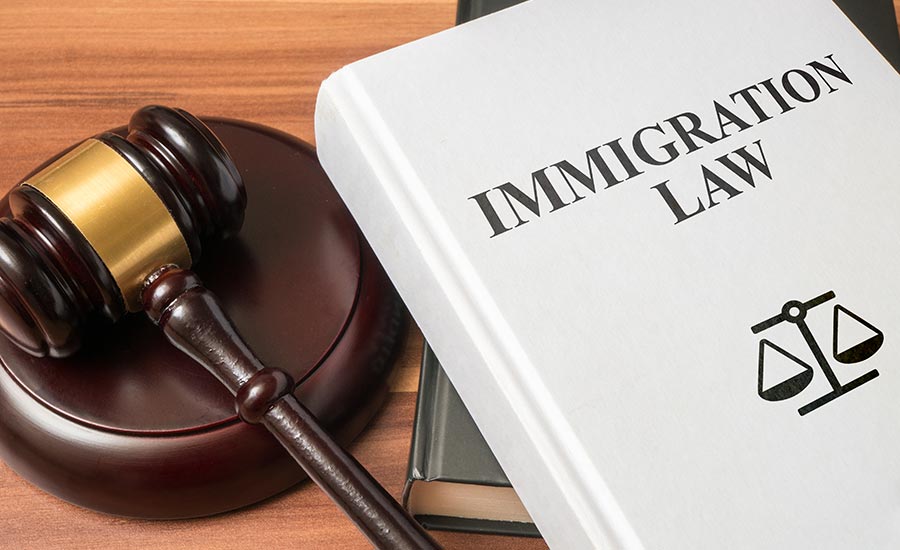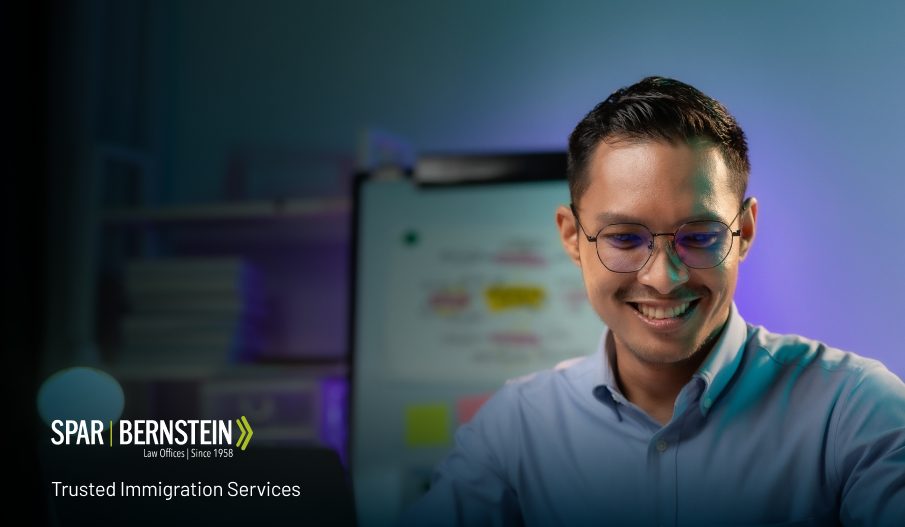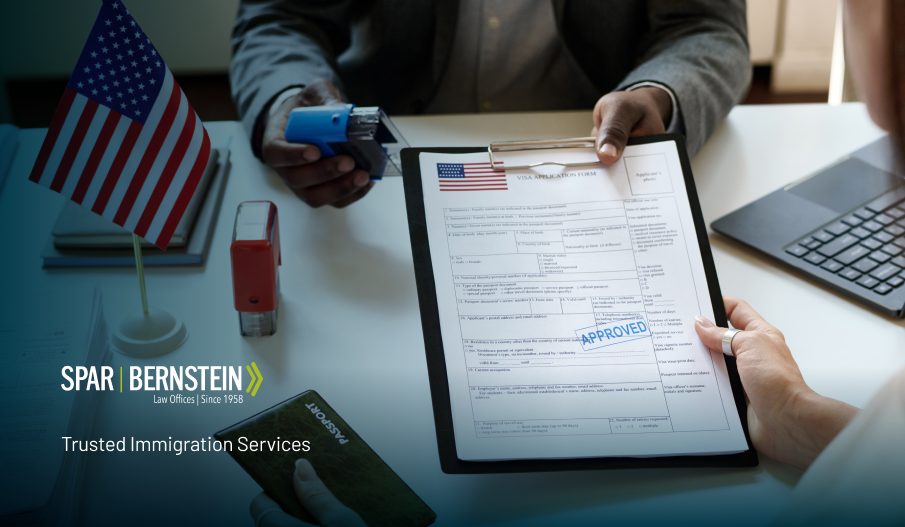

L-1B Visa: Key Points
- The L1B visa enables multinational companies to bring employees with company-specific knowledge to their U.S. offices
- Employers must establish a valid relationship between their U.S. and foreign offices and prove that both are actively operating
- The employer can improve the likelihood of approval by submitting detailed documentation, explaining the employee’s specialized knowledge, and working with an experienced immigration attorney throughout the process
Transferring a key employee with specialized knowledge from a foreign country to your U.S. office can be critical to the success of your company’s operations. It’s possible to do this with an L-1B visa.
In this blog, we’ll share:
- The nature of a L-1B visa and how it differs from L-1A visa
- Your obligations as an employer under the L-1B visa program
- Best practices to increase approval rates
- A step-by-step breakdown of the application process
- Answers to frequently asked questions about the L-1B visa
Understanding The Purpose Of The L-1B Visa
The L-1B visa is a nonimmigrant work visa that allows U.S. employers to transfer employees with specialized knowledge from a foreign office to their office in the United States.
It is intended for individuals who have knowledge of the company’s products, services, research, systems, or proprietary processes that are not common in the industry, and whose transfer will:
- Benefit the organization’s interests
- Help set up an office in the U.S. if there is none at the time of the transfer
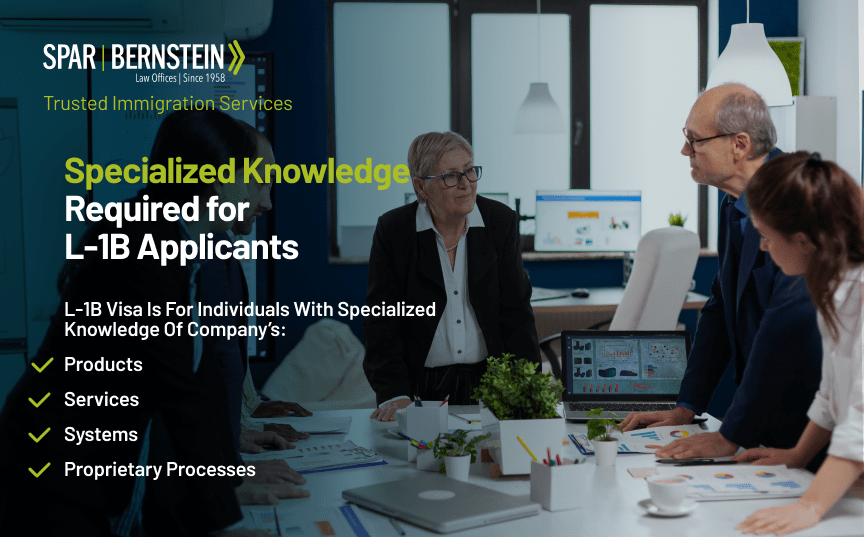
Difference Between L-1A and L-1B Visas
While the L-1A and L-1B fall under the same category — L1 visa — they serve different purposes:
- L-1A is for executives and managers, who can remain in the U.S. for up to seven years. This visa type allows an easier transition to a Green Card compared to L-1B. (Read more about Green Card benefits and Green Card vs. visa.)
- L-1B is for employees with specialized knowledge and is valid for up to three years, with the possibility of a two-year extension. Employees coming to the U.S. to set up a new office have the right to remain in the country for one year. L-1B holders often face more challenges if they decide to pursue permanent residency.
Employer Obligations Under the L-1B Visa Program
To petition for an L-1B visa, employers must meet several requirements and maintain strict compliance throughout the employee’s stay:
- Qualifying relationship: The U.S. company and the foreign company must have a qualifying relationship — parent, branch, affiliate, or subsidiary company.
- Ongoing business: Both entities must not be only established on paper — they must be actively doing business.
- Specialized knowledge: Employers must provide evidence that the Beneficiary has specialized knowledge that is key to their U.S. operations.
- Timely wage & compliance: Employers must pay prevailing wages and maintain compliance with the U.S. Citizenship and Immigration Services (USCIS) and Department of Labor regulations.
- Maintain employment records: Employers must keep clear documentation of the employee’s role, work schedule, and payroll information.
L-1B Visa Requirements For The Employee
To qualify for an L-1B visa, the employee also must meet certain requirements:
- Qualifying employment: They must have worked for the foreign company for at least one continuous year within the three years preceding the petition.
- Industry-specific knowledge: The employee must prove they possess advanced knowledge of company processes or procedures that are critical to operations.
Employers’ Best Practices For Securing L-1B Approvals
To improve your chances of L-1B visa approval, employers should:
- Provide evidence: Support your petition with detailed documentation of the employee’s specialized knowledge and how it will benefit your operations in the United States.
- Use clear language: Avoid vague or generic terms. Instead, explain the specific tools, systems, or processes the employee knows and what makes this knowledge unique.
- Include organizational charts: Submit organizational charts that show the employee’s role within your company’s reporting structure.
- Prepare the employee for a consular interview: Ensure the employee is well-prepared to discuss their knowledge, job duties, and training.
- Consult a law firm: Contact an experienced immigration attorney who will go through the document preparation with you, advise on deadlines, and help with any Requests for Evidence (RFEs) USCIS may require in the process.
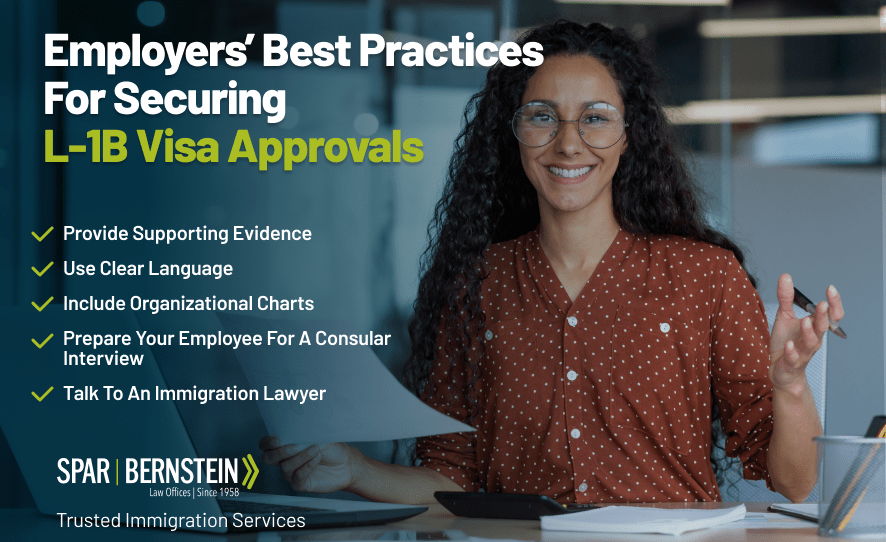
L-1B Visa Process Step By Step
The L-1B visa application process involves several key steps:
1. Petition Filing
The employer files Form I-129, Petition for a Nonimmigrant Worker along with supporting documents to USCIS.
2. Approval Notice
If USCIS approves the petition, they issue and send Form I-797, Notice of Action.
3. Visa Application
The foreign employee applies for an L-1B visa at a U.S. Consulate using Form DS-160, and schedules an interview.
4. Interview
The employee attends an interview where they demonstrate the nature of their specialized knowledge and provide evidence of their qualifications.
5. Entry & Work Authorization
If the visa application is approved, the employee can enter the U.S. and begin employment.
L-1B Visa: Key Takeaways
- The L-1B visa is designed for employees with specialized knowledge who can be transferred to the U.S. to help with operations or setting up an office.
- As an employer, you must show a qualifying relationship and prove the business entities are active in both locations.
- To be eligible for an L-1B visa, the employees must have worked abroad for one continuous year within the last three years.
- To increase the chances of approval, provide supporting evidence, use clear, detailed explanations of the employee’s specialized knowledge, and partner with an experienced immigration law firm.
Need Help With L-1B Visa? Spar & Bernstein Can Help
At Spar & Bernstein, our experienced and compassionate immigration team helps both employers and employees with the L-1B visa process.
We will:
- Evaluate whether your corporate structure meets L-1 requirements.
- Analyze the employee’s background to determine eligibility based on specialized knowledge.
- Help you collect detailed supporting documents, from job descriptions to internal manuals.
- Fill out and file Form I-129.
- Help your employees prepare for their visa interview, increasing their confidence and chances of success.
- Respond to any RFE from USCIS, if they require additional evidence.
- Appeal denials, fighting for your company’s interests.
L-1B Visa: FAQs
If you still have not found the answer you were looking for regarding L-1B visa, check out some frequently asked questions section below.
Can an L-1B visa holder apply for a Green Card?
Yes, an L-1B visa holder can apply for a Green Card but the process is more complex compared to the one for L-1A holders. Contact our knowledgeable team of attorneys at Spar & Bernstein for legal advice.
How long does it take to get an L-1B visa approved?
The standard processing time can take between three and six months, though premium processing (within 15 days) is available.
Can the L-1B employee bring family members?
Yes. Spouses and unmarried children under 21 can apply for L-2 visas, and spouses can apply for work authorization in the U.S.
Is specialized knowledge the same as being highly skilled?
No. Specialized knowledge refers specifically to company-related knowledge —including proprietary systems, services, or products — not general skills.
Can a new office sponsor an L-1B employee?
Yes, but the requirements are stricter as in the role of an employer, you’ll need to show the new office will support the specialized knowledge role within one year.



